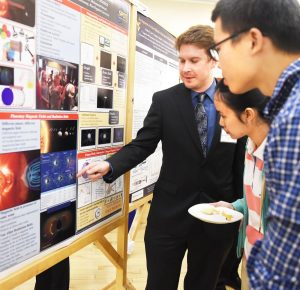MORGANTOWN — Undergraduates at WVU spent several weeks honing their research skills and sharing them with middle schoolers through a poster competition at a summer symposium.
“This is just a continuation of teaching in a different and more creative way,” said Michelle Richards-Babb, associate professor and director of the office of undergraduate research at WVU.
WVU’s Office of Undergraduate Research held its 10th annual Summer Undergraduate Research Symposium. Students spent eight to 10 weeks using their creativity and interests to pick research topics and develop that research under advisors in their fields of study.
In addition to developing research, students had the chance to go to workshops on the ethics of research, attend panels from graduate students and much more.
Richards-Babb said what is most interesting about the program leading up to the symposium is giving the students a fresh learning experience away from the classroom setting and having them apply what they learned in specific research that interests them.
“It’s a lot different than sitting in class,” she said. “As undergraduate researchers, they get to take it and use it on a new problem, to solve a new problem, and now they’re taking everything they learned in class and they’re applying it to a new problem. And they’re able to recreate it and I think that’s what is most interesting about it.”
The students who presented in the poster competition were in different organizations for the summer doing their research: WVU Summer of Undergraduate Research Experience, NanoSAFE Research Experience for Undergraduates (REU), Chemistry REU, Cancer Institute Summer Undergraduate Research Program (SURP) and Louis Stokes Alliances for Minority Participation (LSAMP).
A total of 109 posters were presented at the symposium, with more than 110 students who did the research.
According to Kevin Walden, program specialist for the office of undergraduate research at WVU, the symposium is a community event, open to anyone interested in attending, but a majority are faculty, staff and students.
There were middle school students who were able to talk with the undergraduate research students to explore different fields of study through each poster presentation. This helped those students begin to decide the field that might be for them, according to Walden.
“A lot of the presenters are in competitive programs … these are students that are high-performing and the type of college students you would want to be talking to middle school students,” Walden said.
Walden, participating in his first symposium in his new position, was impressed with the level of time and research done by the students.
“I’m always really impressed with the work they’re accomplishing at their level as undergraduate students,” Walden said. “Research as a whole at the undergraduate level is a newer trend now in higher education — this is as big as it’s been and it’s growing still.”
Jacob Layton, senior biochemistry major at Waynesburg (Pa.) University, said the eight- to 10-week process can be rewarding when the research results turn out as envisioned.
“You feel most rewarded when a simulation you’ve worked on for a number of weeks finally succeeds and you get to see the results you wanted to see,” Layton said.
Layton said he will continue his research through his final year at Waynesburg University — as it’s easily accessible from his computer — and it could be implemented into his future interest when he pursues graduate school.





